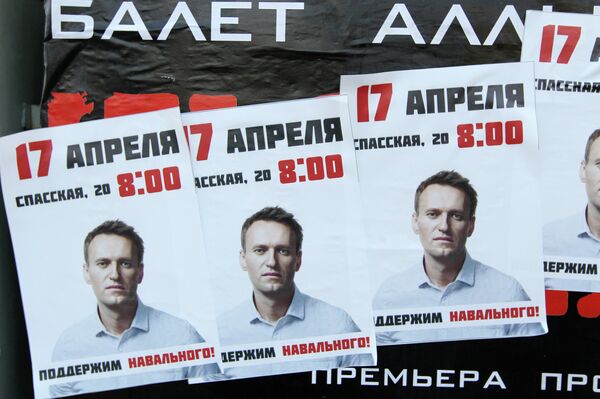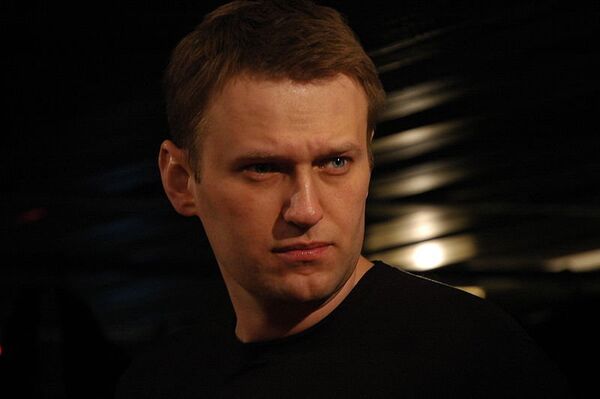MOSCOW, April 16 (Marc Bennetts, RIA Novosti) - Alexei Navalny, the charismatic Russian anti-corruption crusader who led protests against President Vladimir Putin’s long rule, will stand trial this week on charges that could see the Kremlin’s most vocal foe jailed for up to 10 years.
Navalny, 36, is charged with heading a criminal group that investigators say embezzled 16 million rubles ($500,000) worth of timber from a state-run company in central Russia’s Kirov Region, some 500 miles from Moscow, in 2009. The trial begins in Kirov, the region’s largest city, on Wednesday morning.
Navalny and his supporters say the case, which they call “falsified,” is revenge for his outspoken Kremlin criticism and exposés of alleged corruption among Russia’s top officials, and is designed to both tarnish his reputation as a fearless anti-graft campaigner and sideline him politically.
Under Russian law, even a suspended sentence would leave Navalny, who recently expressed his desire to become Russia’s president, unable to run for public office.
“If they give Navalny a seven-year suspended sentence, this will paralyze him politically,” said fellow protest leader Ilya Yashin.
“He won’t be able to run in elections, or even go to demonstrations, because even a minor infringement of the law will see him packed off to a penal colony.”
‘Taunting’ the Authorities
A spokesman for the Investigative Committee, an FBI-style body answerable only to the Russian president, denied last week that the case was politically motivated. He admitted, however, that Navalny’s high-profile activities had intensified the authorities’ scrutiny.
“If a person in a criminal case does all he can to attract attention, or you could even say, taunts the authorities … then the interest in his past grows and the process of exposing him naturally goes faster,” Investigative Committee spokesman Vladimir Markin said in an interview with the Izvestia newspaper.
The investigation into the Kirov allegations was originally opened in December 2010, but quickly closed for lack of evidence. The case was reopened shortly after Navalny dubbed Putin’s United Russia party “crooks and thieves” in February 2011, and fraud charges carrying a maximum sentence of five years were brought against him.
The case was again closed in April 2012, but reopened shortly after on the orders of Alexander Bastrykin, head of the Investigative Committee and a close Putin ally.
The charges, and hence the possible jail time, were ramped up in late July, just days after Navalny accused Bastrykin of owning undeclared foreign real estate and other assets. Navalny and a former political ally, Kirov businessman Pyotr Ofitserov, were charged with “organizing embezzlement on a grand scale,” a charge that carries a maximum sentence of 10 years behind bars.
According to investigators, Navalny, then an aide to the local governor, pressured Kirovles, the state-run timber company, to sell wood to Ofitserov’s company, VLK, at below-market prices. Navalny says he simply consulted Ofitserov as a lawyer and an acquaintance.

Former Kirovles director Vyacheslav Opalev, the official Navalny was originally accused of pressuring to sell the timber, was also charged in the new case. He pled guilty to the charges and was given a four-year suspended sentence in December. Lawyers for Navalny say the guilty plea will add weight to the prosecution’s case.
Kirov Region Governor Nikita Belykh, Navalny’s former boss and a one-time opposition politician, has said neither the local administration nor Kirovles backs the charges against Navalny, which he has called “dubious.”
Jail or Suspended Sentence?
Navalny, citing Russia’s extremely low rate of acquittals in criminal cases (less than 1 percent), has said he is certain he will be found guilty, and that the only question is will he be jailed or handed a suspended sentence. Russian press reports have said the judge at the trial, Sergei Blinov, has never returned a not-guilty verdict; a non-comprehensive search of available records by RIA Novosti did not turn up any acquittals either.
Like Navalny himself, his fellow opposition figures have little doubt that Putin is behind the charges, but some said a jail sentence could backfire for the Kremlin.
“Putin sees Navalny as a potential rival,” said Boris Nemtsov, a fellow protest leader. “But if they jail Navalny they will only increase his popularity. They will turn him into Russia’s Nelson Mandela.”
Currently, just 37 percent of Russians know who Navalny is, according to a survey taken last month by the independent Levada Center. Of those, only 14 percent said they would consider voting for him in presidential elections. (The poll was conducted March 22-25 among 1,601 respondents with a margin of error up to 3.4 percent.)
Navalny’s trial is seen by many in Russia’s splintered opposition movement as an indication of how far the Kremlin is prepared to go with what they call a crackdown on dissent. A number of protest figures have been jailed or charged since Putin returned to the Kremlin in 2012, but the imprisonment of the opposition’s most vibrant figure would, they say, signal a new stage in the clampdown.
“If the authorities are rational, they will give him a suspended sentence,” said Dmitry Oreshkin, a political analyst who sympathizes with the protest movement.
“If they jail him, this will indicate that they are both vengeful and irrational, and moving toward Soviet-style repression.”
A spokesman for Putin said earlier this week that the president had no plans to follow the trial.
Navalny is No Pussy Riot
Oreshkin also drew parallels with last year’s celebrated Pussy Riot case, which saw three women from the anti-Putin punk group sentenced to two years’ jail time for a protest in Moscow’s largest cathedral. (One of them was later released.)
“The authorities might be ruled by a very crude logic that runs, ‘No one has danced in Orthodox cathedrals since we jailed Pussy Riot. So if we jail Navalny, no one will go into the streets to protest,’” said Oreshkin.
Like the Pussy Riot case, Navalny’s trial has made news across Russia, but has failed – so far at least – to capture the imagination of the West, where the jailing of the anti-Putin punk rockers sparked months of outrage and made the group heroes to millions.
“Pussy Riot was about cultural and social issues, like feminism and same-sex marriage, which are also relevant in the West. But Navalny’s relevance is largely confined to Russia,” said Mark Feygin, a lawyer who represented Pussy Riot in court.
He said both cases were politically motivated and that “Navalny is a more significant figure politically than Pussy Riot, in as much as he offers an alternative to Putin’s system, but he will struggle to attract the same amount of attention in the West.”
Up to 150 Navalny supporters are expected to travel to Kirov for the trial, said Vladimir Ashurkov, head of Navalny’s Fund for Fighting Corruption.
“I’m doing all I can to rally support for him, as well as get international attention,” he said.
But while Ashurkov may be seeking to make sure Navalny’s voice gets heard in the West, lawyers for the anti-corruption crusader suspect they will face a tough struggle to make their arguments head in court.
“It will be like banging our heads against a wall,” said lawyer Vadim Kobzev.

